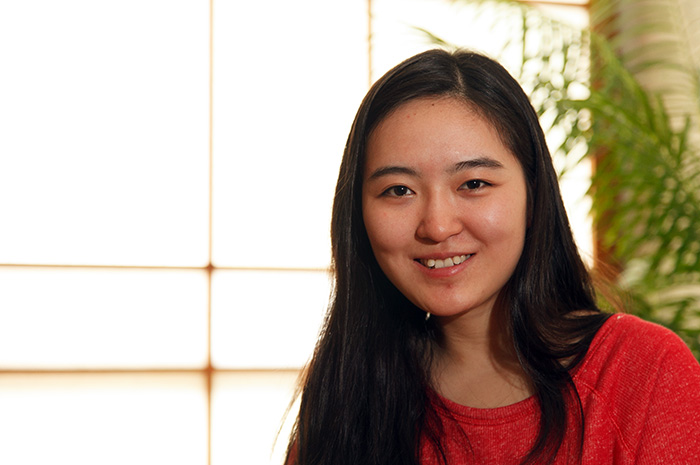Listening to the World's Unheard

An intriguing research project led Lingwei Cheng '14 toward new perspectives and a new career path. Photo by Carl Socolow '77.
Research opens new horizons for Lingwei Cheng '14
by MaryAlice Bitts-Jackson
When Lingwei Cheng ’14 was 15 years old, she encountered a book that would revolutionize her worldview. It was Life and Death in Shanghai, a 1987 account of author Nien Cheng's imprisonment, torture and exile during China's Cultural Revolution, and for Lingwei, a Chinese citizen studying abroad, it was nothing short of a revelation.
“I was really intrigued, because this book gave a very different view than what I’d learned in history classes in China,” Cheng remembers. “Suddenly, I was looking back at my own country with a new perspective, and I wanted to further broaden my view.”
She's done just that, as an international student who double-majors in international business & management and political science and has traveled to Italy twice through Dickinson's study-abroad programs. And when she accepted a research assignment with Neil Diamant, professor of Asian law and society, she again seized the chance to see her homeland anew.
Eye-opening findings
Diamant, an expert in Chinese veterans’ affairs, had hired Cheng to translate, analyze and, in some cases, verify approximately 200 blog posts written by Chinese veterans about their experiences when requesting services from the government. Some veterans faced losing their homes because of a government building project—a not-uncommon situation for rural Chinese citizens—while others sought compensation for injuries sustained during training or reported that they’d been abused by fellow soldiers as new recruits.
“The first time I read about a young recruit who was beaten, I was really surprised and indignant, but when I sent [my case study to Diamant], he told me, ‘This happens all the time,’ ” Cheng says. “And what I learned was that the government is not very responsive.”
As Diamant explains, that’s partly because while the central government mandates certain treatment and benefits for veterans, it does not fund them directly; local officials often reduce costs by limiting benefits or making it hard for veterans to claim them. China also has no agency dedicated solely to veterans’ affairs. “Lingwei quickly understood the political, economic and social complexity of the situation, and she was particularly good at tracking down obscure sources on the Internet,” says Diamant.
Personal ties
For Cheng, the work was not just absorbing—it was personal. Her late grandfather was a Korean War veteran—he once told her that he enlisted to prevent his family members’ executions—and her cousin takes part in a Chinese military-training program akin to the U.S. Army ROTC. So when she traveled back to China last summer to serve internships at a state news agency—researching and writing articles; editing text, video and images; and interviewing news subjects—Cheng remained invested in the project, sending Diamant a photo of a veterans' protest. Back on campus last fall, she also helped proof Diamant’s article about the findings, which will soon appear in the peer-reviewed journal Modern China.
As she prepares to graduate this spring, Cheng looks forward to deepening her understanding of the issue on a global scale. She’s decided to pursue a graduate degree in public policy at Georgetown University.
“I was planning to take the LSAT, but I realized last semester that what I’m passionate about is public policy,” she said, adding that she plans to investigate ways that veterans’ lives could be improved. “It’s something that affects many more people, all around the world.”
Learn more
Published April 23, 2014